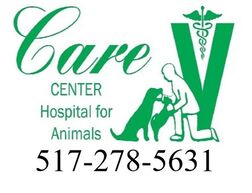Spay and Neuter
Spaying (female) and neutering (male) are almost always recommended for all pets that are not going to be bred. If you are planning on breeding, make sure to do extensive research. Breeding can be very costly, time consuming and complicated. Please speak with our doctors to decide on a plan of action if this is something you are considering.
Spaying or neutering your pet at a young age can reduce problems and health complications later in life. At the Care Center Hospital for Animals we can spay/neuter your pet as young as 16 weeks of age. Spays/neuters are normally scheduled on a Tuesday or Thursday as these are our normal surgery days. Microchipping your pet can also be done at this time while your pet is under anesthesia.
Read more about why it's so important to spay or neuter your dog and/or cat!
Spay/Neuter Procedure:
We will call you the day before surgery to confirm your pet's appointment. At this time we will tell you your pet should not have food after midnight the night before surgery. The morning of surgery we will have you drop your pet off between 8:00 - 8:30 am. We understand this may be difficult for some families, so please let us know if you would like to drop your pet off the night before at no extra charge. During surgery your pet's heartbeat, breathing and pulse will be monitored. Gas anesthesia is used and injectable pain medication is given during the procedure. Your pet will be monitored by a technician while he/she is waking up from anesthesia. This helps us catch any adverse reactions before they become a problem. Once the surgery is complete and your pet is fully awake, we will call to let you know when they will be able to go home. Most pets are able to go home the same day as surgery. However, any cat being spayed/neutered and declawed at the same time will require overnight hospitalization.
Microchip:
Prior to your pet's spay or neuter you may be asked if you would like to microchip your pet. While your pet is sleeping under anesthesia is the best and easiest time to microchip. The microchip is about the size of a grain of rice. It's inserted under the skin and has an identification number specifically for your pet. If your furry friend ever becomes lost this microchip could be their ticket back home. Click the link to learn more about microchipping your pet!
Spaying (female) and neutering (male) are almost always recommended for all pets that are not going to be bred. If you are planning on breeding, make sure to do extensive research. Breeding can be very costly, time consuming and complicated. Please speak with our doctors to decide on a plan of action if this is something you are considering.
Spaying or neutering your pet at a young age can reduce problems and health complications later in life. At the Care Center Hospital for Animals we can spay/neuter your pet as young as 16 weeks of age. Spays/neuters are normally scheduled on a Tuesday or Thursday as these are our normal surgery days. Microchipping your pet can also be done at this time while your pet is under anesthesia.
Read more about why it's so important to spay or neuter your dog and/or cat!
Spay/Neuter Procedure:
We will call you the day before surgery to confirm your pet's appointment. At this time we will tell you your pet should not have food after midnight the night before surgery. The morning of surgery we will have you drop your pet off between 8:00 - 8:30 am. We understand this may be difficult for some families, so please let us know if you would like to drop your pet off the night before at no extra charge. During surgery your pet's heartbeat, breathing and pulse will be monitored. Gas anesthesia is used and injectable pain medication is given during the procedure. Your pet will be monitored by a technician while he/she is waking up from anesthesia. This helps us catch any adverse reactions before they become a problem. Once the surgery is complete and your pet is fully awake, we will call to let you know when they will be able to go home. Most pets are able to go home the same day as surgery. However, any cat being spayed/neutered and declawed at the same time will require overnight hospitalization.
Microchip:
Prior to your pet's spay or neuter you may be asked if you would like to microchip your pet. While your pet is sleeping under anesthesia is the best and easiest time to microchip. The microchip is about the size of a grain of rice. It's inserted under the skin and has an identification number specifically for your pet. If your furry friend ever becomes lost this microchip could be their ticket back home. Click the link to learn more about microchipping your pet!



